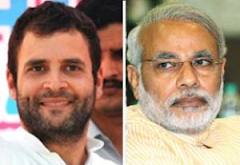
Barabanki, August 20: In comments that can stoke a fresh controversy, Union minister Beni Prasad Verma today said the next Lok Sabha elections will see a direct fight between Rahul Gandhi and Narendra Modi.
A day after he said that the SP chief Mulayam Singh Yadav was "dreaming" of becoming Prime Minister, Verma today said that parties like Samajwadi Party do not have all India presence and hence cannot form a government at the Centre.
"The government (at the Centre) will either be of Congress or Modi. Why they (SP) are misleading. Does the public not understand all this.... If Rahul Gandhi is our candidate, then the election in 2014 will be Rahul Gandhi versus Gujarat chief minister Narendra Modi. No other party is in between," Verma said.
The Union minister, however, steered clear of drawing a parallel between Prime Minister Manmohan Singh and Rahul Gandhi saying "If Rahul Gandhi will become Prime Minister, he will do so with the blessing of Manmohan Singh".
Verma also hailed the Prime Minister as a "frank" person saying the country will never get such a "gentle" person as Prime Minister. "The whole world considers him an honest persons except the Opposition parties in our country," he said.
Verma said that he always wanted Rahul Gandhi to become the Prime Minister but the decision on when has to be taken by the Congress President and the Prime Minister.
"Who fights for Muslims. It is Congress, which fights for them at the national level. Small insignificant parties have misled them. Congress is concerned about Muslims, Hindus, Christians and all and on the other had there are the traders of votes, who are concerned only about their votes," he said.
Asked to comment on the statement of Samajwadi Party leader Mohan Singh that he should be sacked from the Union Cabinet, Verma said he would not like to react to "small time" leaders who have managed to get a Rajya Sabha membership.
"If he can, let him have me removed from the Cabinet. My ideology will remain the same...I don't take cognizance of seasonal frogs," he said.
Verma, however, refused to comment on Singh's statement that SP would withdraw support if he does not apologize.
He had yesterday alleged that due to interference of Samajwadi party supremo Mulayam Singh Yadav in UP government, it could not function properly.
"Due to interference of Mulayam, the state government cannot function properly and he is responsible for this", Verma had said while talking to reporters yesterday. Verma said he would not blame chief minister Akhilesh Yadav, saying he is "like my son". On Mulayam Singh stating that a third front government at the Centre will emerge in 2014 if SP won 60 seats in UP, Beni said that Yadav was dreaming of becoming Prime Minister but it would not happen.







Comments
Add new comment